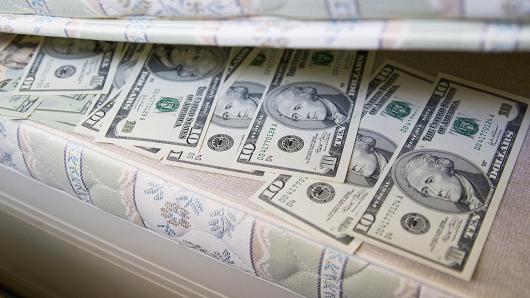9.3
8.064 reviews

English
EN
More and more Americans are keeping some of their savings at home in the form of banknotes and coins, according to the book CNBC based on a survey of 1,820 American Express customers. Of all respondents, 29% have some of their savings at home in the form of cash. This is even more common among people in their twenties. Within this age group, 67% have withdrawn some of their savings from the bank in order to be able to store them outside the banking system.
"We have been asking people for some time how they store their savings and in recent years we have seen an increase in the number of people opting for cash", explained Kimberly Litt of American Express. It was the first time that this financial institution asked specific questions to customers about hiding savings.
Emergency Preparedness
The survey also found that about a quarter of customers expect a financial emergency scenario this year and that storing cash at home aims to be better prepared for such a scenario. But that's not the only reason to keep more cash in the house. Litt notes that there are also households that budget for monthly expenses and take that money out at the beginning of the month and put it in an envelope to have more visibility into what they're spending.
American Express did not ask its customers where in the house they kept the money. A previous 2012 survey of 1,080 adults found that the freezer was the most popular hiding place with 27% of the vote. Just under 20% of Americans who keep money at home put it in a chest of drawers, while only 11 percent actually put the money in a mattress. One in ten respondents choose a cookie jar as a hiding place, while 9% kept their savings in another location in their home.
Banking crisis
"We saw this phenomenon increase sharply in 2008, when the banking crisis began," security expert Todd Morris of BrickHouse Security told CNBC. This company installs security equipment and surveillance systems. According to Morris, this trend has continued in recent years, as he notes that more people are having safes installed in walls and floors to store important documents and valuables.
Due to the increasing distrust of banks and the soundness of the financial system, more and more people are choosing to keep (part of) their savings at home in the form of cash or precious metals. That may indeed prove to be a wise choice when more banks fail or when a financial emergency breaks out.
Risks
By keeping savings at home, people still take a risk, such as theft and fire. Also, savings in the home are not covered by the deposit guarantee scheme but by the household effects. That is much more difficult to insure.
There are also sad stories of people who were unaware of savings that family members kept at home. CNBC cites the example of an Isrealian woman who threw away her mother's old mattress in 2009. It contained the entire savings capital of an estimated $1 million. There was also once a man who gave away his suit to someone else, only to learn afterwards that it contained $13,000 in bills.
Although it can be useful to have part of the savings within reach outside the banking system, it is wise from the point of view of risk diversification to also leave part of it in a bank account.
CNBC writes that the people who keep savings at home should be aware that thieves know the usual hiding places and will look there first. It is therefore advisable to come up with a creative place where people will not easily look. It is not convenient to keep the money in many different places throughout the house, because you can quickly lose the overview. CNBC also advises to inform at least one person about the hiding place, so that there is less chance that the hidden savings will be thrown away. In the event of death, surviving relatives can also find the savings.

Americans are increasingly keeping cash in their homes
